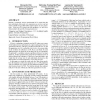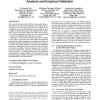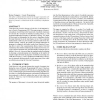50 search results - page 2 / 10 » Quadratic Bloat in Genetic Programming |
GECCO
2008
Springer
13 years 6 months ago
2008
Springer
Elitism is commonly used in generational GP to ensure that the best individuals discovered in a generation are not lost, and are made available for possible further improvements t...
CEC
2003
IEEE
13 years 10 months ago
2003
IEEE
Abstract- The Maximum Homologous Crossover attempts to preserve similar structures from parents by aligning them according to their homology. In this paper, it is successfully test...
GECCO
2008
Springer
13 years 6 months ago
2008
Springer
The crossover bias theory for bloat [18] is a recent result which predicts that bloat is caused by the sampling of short, unfit programs. This theory is clear and simple, but it ...
GECCO
2004
Springer
13 years 10 months ago
2004
Springer
Abstract. Bloat control is an important aspect of evolutionary computation methods, such as genetic programming, which must deal with genomes of arbitrary size. We introduce three ...
GECCO
2005
Springer
13 years 10 months ago
2005
Springer
Code bloat, the excessive increase of code size, is an important issue in Genetic Programming (GP). This paper proposes a theoretical analysis of code bloat in the framework of sy...



